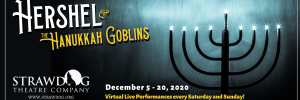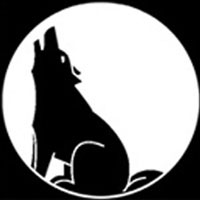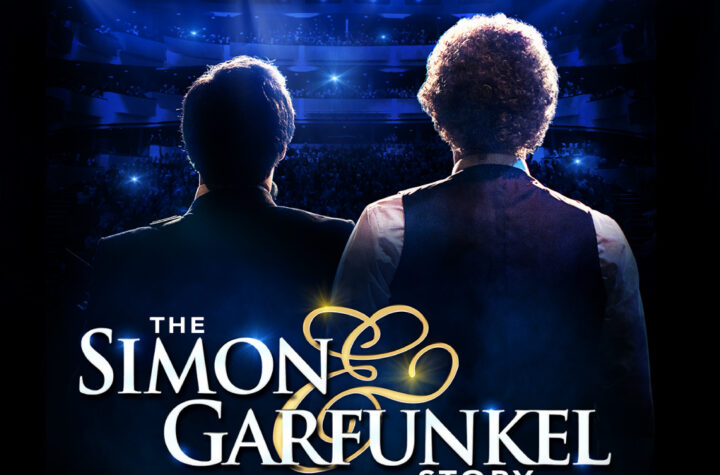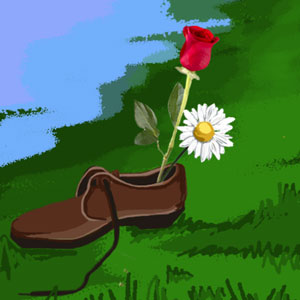
 Somewhat Recommended ** How do you teach a young child about evil in this world? How do you teach a child about the mystery of faith? How do you teach a child about the distinct cultural traditions of your religion and the stories of your ancestors? “Hershel and the Hanukkah Goblins” is an online children’s show of Jewish interest that attempts to do all these things. Adapted by Michael Dailey from the book of the same name by Eric Kimmel, it is based in part on Hershel of Ostropol (a/k/a Hershele Ostropoler), a prominent figure in Jewish humor who lived in Ostropol, Poland (now Ukraine), from 1757 to 1811. A Yiddish-speaker, he earned a fine reputation for telling jokes and stories. According to Wikipedia, he was “something of an ethnic folk hero, who could take on establishment forces much larger than himself with nothing but his humor.” Today’s production on Zoom revives Hershel’s legacy by relating a tale that he might well have told all those years ago.
Somewhat Recommended ** How do you teach a young child about evil in this world? How do you teach a child about the mystery of faith? How do you teach a child about the distinct cultural traditions of your religion and the stories of your ancestors? “Hershel and the Hanukkah Goblins” is an online children’s show of Jewish interest that attempts to do all these things. Adapted by Michael Dailey from the book of the same name by Eric Kimmel, it is based in part on Hershel of Ostropol (a/k/a Hershele Ostropoler), a prominent figure in Jewish humor who lived in Ostropol, Poland (now Ukraine), from 1757 to 1811. A Yiddish-speaker, he earned a fine reputation for telling jokes and stories. According to Wikipedia, he was “something of an ethnic folk hero, who could take on establishment forces much larger than himself with nothing but his humor.” Today’s production on Zoom revives Hershel’s legacy by relating a tale that he might well have told all those years ago.
It is not my aim to pan shows during the pan-demic, but “Hershel and the Hanukkah Goblins” has its problems. Despite its lofty ambitions, the way in which its thematic elements are brought together makes watching the performance somewhat disappointing. It suffers from being highly amateurish in appearance and artistry, and there are weaknesses in the script.
The story goes like this: A traveling theatre group called the Ovals of Ostropol is made up of Hershel (Rebecca Keeshin) and her colleagues Sam, Fanny, and Doron (Julia Atkin, Sonia Goldberg and Ian Michael Minh). Hungry and tired, the troupe travels to Chelm, a village in Poland, in search of food and a place to sleep. But the innkeeper has no place for them, and Hershel bargains with him: In return for dinner and shelter for the night, she and the troupe will perform for all his guests. The innkeeper agrees to terms, and the subsequent show is based on a story that was told to Hershel by her grandfather—who (coincidentally) is also named Hershel—about how he saved Hanukkah.
The plot drags in spots, for example, when Hershel and one of the goblins play a game of dreidel. This sort of interactive type of game can be a lot of fun in person, but watching others play it doesn’t work well. At other times, mild tensions in the story are not resolved in an interesting fashion. For example, during the preshow, children in the remote audience are asked to think up a magic word to dispel the goblins—and at the right moment (in the Zoom chat), we are told to have a grown-up type in the word. It could be a made-up word or a real one. Well, one word entered in was “wizard” and others wrote “nooooo” and “booooo.” (FYI: I added my own word, which was “lacigam”, or magical spelled backwards.) In the end, it wasn’t important which word was chosen (or if any word was chosen), because this was never meant to be the climax of the show anyway. Another fault is the totally dark screen that predates the arrival of the King of the Goblins; the remote viewer at first thinks that there must be a technical glitch: that a camera has accidentally failed.
With the exception of one of the puppets and all the drawings that have made their way into the coloring book, the props are slapdash, and the sets, masks, and costumes are substandard. By far, the best part is the appropriately festive music. Credit must go to Jacob Combs for the wonderful songs (music and lyrics) and to music director Celia Villacres. The characters do a nice job singing these Jewish-themed holiday songs accompanied by the ukulele and guitar. Keeshin’s voice engages us all. The score is excellent and stands on its own.
This tale about the magic of the Hanukkah candles and the menorah falls into line with folktales of old having to do with mysticism if not also superstition. Before the scientific age, it was often believed that the shofar (or ram’s horn) that was blown on the Jewish New Year (Rosh Hashana) was intended to scare off Satan and his demons. Just like stories about demons attempting to block the sound of the shofar, the goblins (a softened and less scary form of demon) try to keep Hershel from lighting the Hanukkah candles at the synagogue, thus preventing the Jews from getting close to God and becoming free from adversity. So when Hershel exorcises the goblins (demons) by reasoning with them, he actually does something much bigger than just saving Hanukkah: He saves the world! Consequently, people today can light their menorahs unhindered and can bring in the light. The Hanukkah candles become symbolic of God acting in the real world as compared to simply being a reminder of miracles of the past and “days long ago.”
The show is in English with a smattering of Hebrew, and most of the Hebrew has to do with reciting the Hanukkah blessings. It is geared to children between the ages of three and ten, but unfortunately, I’m not sure it will hold their attention throughout. The pre-show at the beginning, however, was engaging when the characters talked about religious traditions. I particularly liked the question, “Did you color your latkes yet?” I would like to see more Hanukkah-themed shows that, to my mind, can capture the spirit of the freiliche holiday and can better explain it to an uninitiated audience.
Directed by Spencer Ryan Diedrick, “Hershel and the Hanukkah Goblins” is a production of Strawdog Theatre Company and is available as a live stream on Zoom through December 20, 2020.
Performances take place on Saturdays and Sundays at 1:00 p.m. and 4:00 p.m.
Tickets are $25 to $30 per household and are currently available at www.strawdog.org.
Additional interactive perks are available for the $30 ticket holders. These include:
Access to preshow and postshow interaction time with the performers; opportunities to participate in the show, learn dance moves, and enjoy a special sing-along of the Latke Song; and the ability for a child to show off their coloring book or to be on camera (if selected to do so via a webcam).
For more information, go to http://www.strawdog.org/shows/hershel-and-the-hanukkah-goblins-2019-1. or contact boxoffice@strawdog.org.
Strawdog will share a portion of ticket sales with The Jewish Council on Urban Affairs, working to transform Chicago into a city free of poverty, racism and antisemitism. For additional information, visit jcua.org.
Strawdog Theatre Company is a 501(c)3 non-profit organization and contributions are tax-deductible to the extent allowed by law. Please consider making a donation by going to the website www.strawdog.org.
[As an aside, “Hershel and the Hanukkah Goblins” is very well grounded in Yiddish folklore, specifically with its reference to the village of Chelm. The Wise Men of Chelm stories are authentic Jewish folktales written down in the volumes of Isaac Bashevis Singer. Chelm is a real city in Poland, but in the 19th century, it became portrayed as a village of fools who think they are wise; or perhaps they are wise men whom outsiders think of as being fools. The rise of the folkloric Chelm coincidentally appears with the slow infiltration of modern-day Enlightenment rationality into the rural shtetls of Eastern Europe, in an area once called the Pale of Civilization. A vast oral tradition in Yiddish allowed Jews to amuse themselves by telling each other tales of ordinary life and the miracle of the holidays.]
To see what others are saying, visit www.theatreinchicago.com, go to Review Round-Up and click at “Hershel and the Hanukkah Goblins”.






More Stories
“The Simon & Garfunkel Story”
“Women Beware Women”
“Barefoot in the Park”